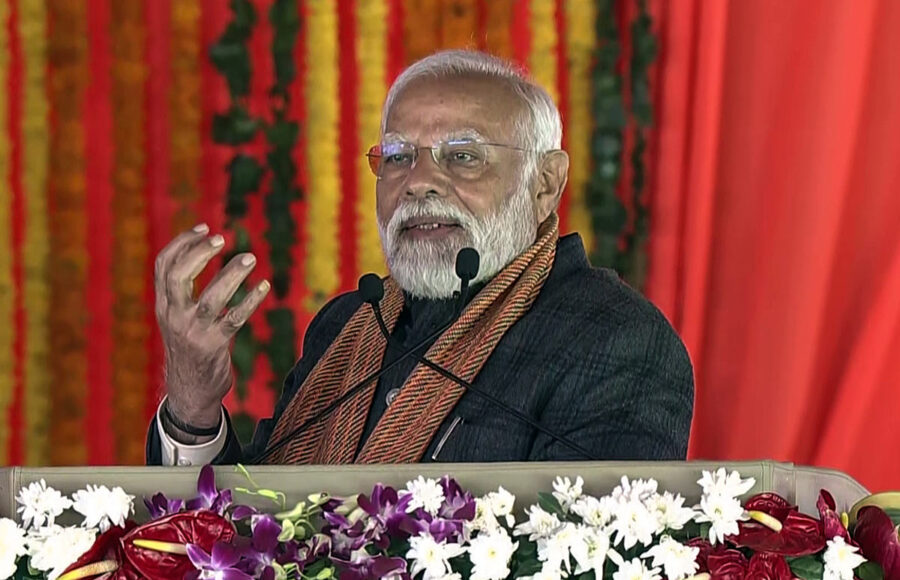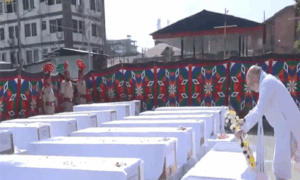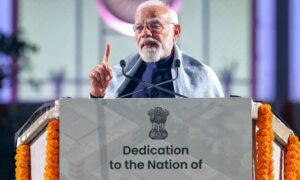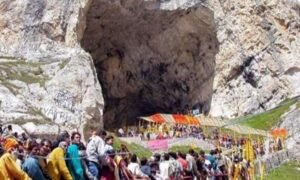
The recent maiden visit by Prime Minister Narendra Modi to the state of Jammu and Kashmir since the abrogation of the Article 370 in 2019 was welcomed by the Kashmiris with much fanfare. It was a huge crowd at the Bakshi stadium where Modi said, “I am working hard to win your hearts, and my attempt to keep winning your hearts will continue.” The area around was placed under a security blanket, with thousands of soldiers and paramilitary forces deployed and new checkpoints set up. Modi claimed that the removal of Article 370, which granted a measure of autonomy to Indian-administered Jammu and Kashmir, had ushered in development and peace.
He unveiled a slew of development projects worth more than Rs 6,400 crore, with initiatives worth nearly Rs 5,000 crore for boosting the agri-economy in the Union Territory. “Along with tourism, Jammu and Kashmir also has the strength of agriculture and agricultural products. Jammu Kashmir’s saffron, apple, dry fruits here, Jammu Kashmir Cherry, Jammu and Kashmir is such a big brand in itself,” said Modi. He also launched nationwide projects related to the tourism sector worth more than Rs 1,400 crore under the ‘Swadesh Darshan’ and ‘PRASHAD’ (Pilgrimage Rejuvenation And Spiritual, Heritage Augmentation Drive) schemes, including a project for the integrated development of the Hazratbal shrine in Srinagar. Modi added, “Srinagar is making big strides in tourism. This does not only help Jammu and Kashmir but the entire country. Today, we have dedicated to the nation 6 projects under the Swadesh Darshan Yojana. Along with this, we have launched the next phase of this scheme. Around 30 such projects have been kickstarted across the country.” Modi also inaugurated the ‘Dekho Apna Desh People’s Choice Tourist Destination Poll’ and the ‘Chalo India Global Diaspora’ campaign as well, besides announcing tourist destinations selected under the Challenge-Based Destination Development (CBDD) scheme.
However, apart from launching a slew of projects, the two new regions – Jammu and Kashmir, and Ladakh – have been without a state legislature since 2019. The last state elections were held in 2014, the year Modi first came to power. In December 2020, the first local elections took place to elect 280 members of District Development Councils (DDC) across Indian-administered Kashmir’s 20 districts. The DDC members, however, do not have the power to amend or introduce laws. There have also been elections to fill seats in the village councils, also called panchayat, and municipal bodies, but they have very limited power, with the region ruled by New Delhi’s representative and bureaucrats.
Though the Supreme Court of India has ordered the government to hold local elections by September 30, 2024, and the Kashmir’s pro-India political parties too have been demanding that elections be held in the region, there is still no clarity when will Modi led government hold the elections.
After the abrogation of the Article 370, the Indian government also removed Article 35A of the Indian Constitution, which barred outsiders from permanently settling, buying land and holding local government jobs in the Muslim-majority region, whereas other Indian states such as Himachal Pradesh, Uttarakhand, Jharkhand and Odisha continue to safeguard the property rights of local residents, mostly tribal or Indigenous people. The non-Kashmiris can now buy property in the region. These fears were further fuelled by a new domicile law for Indian citizens that the Indian Ministry of Home Affairs introduced in April 2020.
Under the domicile law, those who have lived in the Indian-administered region for 15 years, or have studied for seven years and appeared in secondary or high school-leaving examinations in educational institutions located in the region, are eligible to become permanent residents. Children of government officials who have served for 10 years in the region are also granted domicile status.
The road ahead for the BJP is certainly an uphill task, as the abrogation of Article 370 comes with a lot of baggage. Holding of assembly elections peacefully, clarity on the domicile status, employment for the youth are some of the key areas to be covered. Though Jammu and Kashmir is returning to a normal life gradually, there are tasks which still need to fulfilled. Only time will tell how successful the present government has been in selling the dreams to the people of J&K.
[the_ad id=”55722”]


















